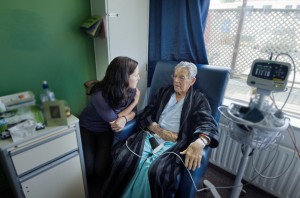 GenomeDx Biosciences recently announced the publication of a positive validation study for its Decipher Prostate Cancer Classifier, a genomic test for men with intermediate and high-risk prostate cancer.
GenomeDx Biosciences recently announced the publication of a positive validation study for its Decipher Prostate Cancer Classifier, a genomic test for men with intermediate and high-risk prostate cancer.
In the study titled “A Genomic Classifier Identifies Men with Adverse Pathology after Radical Prostatectomy Who Benefit from Adjuvant Radiation Therapy,” published in the Journal of Clinical Oncology,” researchers from the Thomas Jefferson University and the Mayo Clinic, found that patients with low genomic risk (GC) (assessed with Decipher) are well managed only with clinical observation after radical prostatectomy (RP), while those with high genomic risk may be better treated with earlier adjuvant radiotherapy.
Evidence from a considerable number of randomized clinical trials has shown that after surgery, earlier adjuvant radiotherapy reduces cancer progression and recurrence compared to a wait-and-see method. Based on these results, current AUA and ASTRO guidelines advise that doctors should recommend adjuvant radiotherapy after surgery for men with a diagnosis of intermediate and high-risk prostate cancer. Still, not all men seem to benefit from early adjuvant radiotherapy, therefore making it necessary to identify which men can benefit and which cannot, reducing unnecessary treatment and adverse side effects like incontinence, impotence, and rectal bleeding.
“The optimal timing of post-prostatectomy radiation therapy is a subject of debate,” said Robert Den, M.D., of the Sidney Kimmel Medical College of Thomas Jefferson University and lead author of the study in a recent news release. “Common practice is to wait for prostate-specific antigen (PSA) rise after surgery before intervening with radiation treatment. The results of this study suggest that we can use a genomic test to identify a group of men who will benefit from earlier administration of additional local treatment.”
Decipher enables clinicians to individualize clinical management and to identify which patients may benefit from early radiotherapy and those who can delay it, avoiding adverse side effects. The American Society of Clinical Oncology (ASCO) guidelines certified the AUA recommendations, but said that, “not all men with adverse pathology are at equal risk for recurrence.” Currently, the National Comprehensive Cancer Network indicates that “tumor-based molecular assays to better stratify patient risk” and selection of adjuvant therapy are preferred for optimal diagnosis.
“We’ve known Decipher’s prognostic capability from earlier research, and with this research, we were able to demonstrate that there’s a predictive component as well,” said R. Jeffrey Karnes, M.D., associate professor and vice chair in Urology at Mayo Clinic and an investigator on the study in a news release. “Determining the right patient and the right time for radiation therapy is not straightforward. Patients have to balance the potential complications from radiation treatment with the risk of prostate cancer recurring. This test may enhance our ability in deciding who should or should not be considered for adjuvant radiation versus close monitoring.”
A total of 188 patients with prostate cancer took part in the research. All men had received radiotherapy after prostate surgery from 1990 to 2009. Results revealed that Decipher was able to accurately predict high risk for metastasis with 83% precision. The device was also able to stratify a cumulative incidence of metastasis at 5 years after RT, ranking at 0%, 9%, and 29% for low, average, and high GC scores, respectively. Data analysis also revealed that the GC and pre-RP prostate-specific antigen were independent predictors of metastasis.
Within the low GC score, the results revealed no differences in the cumulative incidence of metastasis comparing patients who received adjuvant or salvage RT. However, for patients with higher GC scores, cumulative incidence of metastasis at 5 years was 6% for patients treated with adjuvant RT compared with 23% for patients treated with salvage RT.
In addition, the study found no inconvenience for salvage therapy in men with low-risk Decipher results, suggesting that these men may improve quality of life by waiting for a possible PSA increase rather than taking a course of immediate radiation therapy after radical surgery.
The researchers concluded that men with low genomic risk are better treated with salvage radiotherapy, and those who have a high genomic risk benefit from adjuvant radiotherapy.

